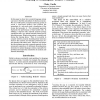72 search results - page 5 / 15 » Minimal Contraction of Preference Relations |
ASP
2005
Springer
14 years 3 months ago
2005
Springer
The extended answer set semantics for simple logic programs, i.e. programs with only classical negation, allows for the defeat of rules to resolve contradictions. In addition, a pa...
ASPDAC
2006
ACM
14 years 3 months ago
2006
ACM
— In this paper, we introduce a novel substrate noise estimation technique during early floorplanning, based on the concept of Block Preference Directed Graph (BPDG) and the cla...
COGSCI
2010
13 years 9 months ago
2010
A well-established principle of language is that there is a preference for closely related words to be close together in the sentence. This can be expressed as a preference for de...
CIKM
2010
Springer
13 years 8 months ago
2010
Springer
Most database systems allow query processing over attributes that are derived at query runtime (e.g., user-defined functions and remote data calls to web services), making them e...
AAAI
1992
13 years 10 months ago
1992
In this paper we show how a natural language system can learn to find the antecedents of relative pronouns. We use a well-known conceptual clustering system to create a case-based...

